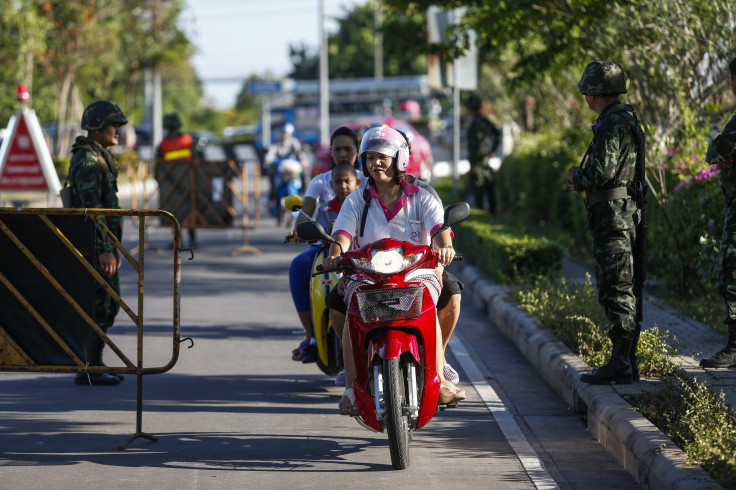Thais Ponder Election Under Martial Law As Way Out Of Crisis

(Reuters) - Thailand's Election Commission was due to consider on Wednesday the caretaker government's proposal for an August 3 election, as doubts grew that polls could be held smoothly despite the imposition of martial law to calm street violence.
Army chief General Prayuth Chan-ocha denied Tuesday's declaration of martial law amounted to a military coup, saying he had acted to restore order and build investor confidence. The caretaker government says it is still in charge.
Both pro- and anti-government protesters remain out in force but the army has confined them to their separate protest sites and there were no reports of trouble overnight.
Twenty-eight people have been killed and 700 injured since the latest chapter in a near-decade-long power struggle between former Prime Minister Thaksin Shinawatra and the royalist establishment flared up late last year.
The turmoil has brought the country to the brink of recession and even raised fears of civil war.
The anti-government protesters remain implacably opposed to an election for now. They want a "neutral" prime minister installed to oversee electoral reforms aimed at ending the influence of former telecommunications tycoon Thaksin.
The government, on the other hand, sees a general election that it would likely win, given Thaksin's enduring support among the rural and urban poor, as the best way forward.
Acting Prime Minister Niwatthamrong Boonsongphaisan, a minister in the government of Thaksin's sister, Yingluck Shinawatra, who took over when she was forced to step down as prime minister by a court two weeks ago, proposed on Tuesday that an election should be held on August 3.
Somchai Srisutthiyakorn, a member of the Election Commission, said all sides had to consider the proposal.
"The situation has changed now. We have martial law, therefore the Election Commission, the army and the government should talk first," Somchai told Reuters. "I can't say yet whether an August 3 election will happen."
RED SHIRT WARNING
Anti-government protesters disrupted a February 2 election that Thaksin's loyalists looked set to win. It was later declared void.
Thaksin's "red shirt" activists have warned of trouble if the caretaker government is ousted and replaced with a "neutral" prime minister but some analysts saw that as likely despite the threat of a backlash.
"With martial law in place, we believe violence could be contained," Pimpaka Nichgaroon, head of research at Thanachart Securities, wrote in a note.
Pimpaka said the main question was whether an interim government came about through a coup or through a resolution by the upper house Senate, Thailand's only functioning legislature.
"Any kind of interim government would be a better scenario for Thailand than the current political deadlock with a non-functional caretaker government."
The army has ordered 14 satellite TV channels, both pro- and anti-government, to stop broadcasting and it has warned against the spread of inflammatory material on social media.
Human rights groups have said the declaration of martial law was akin to a coup.
© Copyright IBTimes 2024. All rights reserved.







